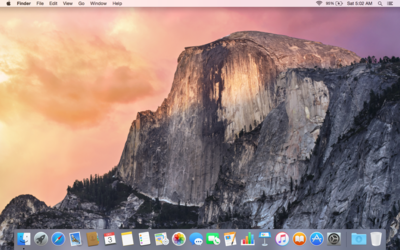Version 10.11: 'El Capitan' OS X El Capitan was revealed on June 8, 2015, during the WWDC keynote speech. It was made available as a public beta in July and was made available publicly on September 30, 2015. Mac OS X El Capitan 10.11.6 is an advanced operating system for Mac, which brings a definite improvement in performance, privacy comprehensiveness, more stability, better file search and a revamped user experience. The latest version has arrived with some focused technological enhancements, that are needed to be highlighted in a glance.
Question or issue on macOS:
- If you are wondering what the latest version of macOS is it's Big Sur! And rather than macOS 10.16, it is macOS 11. OS X 10.11: El Capitan (Gala) - 30 September 2015 macOS 10.12: Sierra (Fuji.
- Aug 09, 2021 El Capitan, or Mac OS X 10.11, is the latest update of Apple’s operating system for Mac. This marks the first time in a while that the release of OS X and iOS (iOS 9) have appeared almost simultaneously – allowing for more synergy between the platforms.
- El Capitan 10.11.6 is now released as the latest version of Download El Capitan. For OS X El Capitan users this update is recommended. The upgrade to OS X El Capitan v10.11.6 enhances your Mac's reliability, performance and protection and is advised for all users. Solves a problem that can prevent parental control accounts from saving settings.
I have used brew install openssl to download and install openssl v1.0.2f, however, it comes back saying:
And when I do openssl version -a it always gives me:
How can I replace the old version with the new one? I’ve searched a lot on how to do this, but the solutions online don’t seem to work for me…
How to solve this problem?
Solution no. 1:
Execute following commands:
You will have the latest version of openssl installed and accessible from cli (command line/terminal). Since the third command will add export path to .bash_profile, the newly installed version of openssl will be accessible across system restarts.
Os X El Capitan Latest Version - Data.resolviendo.co
Solution no. 2:
Only
has worked for me!
Thank you mipadi.
Solution no. 3:
Try creating a symlink, make sure you have openssl installed in /usr/local/include first.
More info at Openssl with El Capitan.
Solution no. 4:
I can’t reproduce your issue running El Cap + Homebrew 1.0.x
Upgrade to Homebrew 1.0.x, which was released late in September. Specific changes were made in the way openssl is linked. The project is on a more robust release schedule now that it’s hit 1.0.
You should fix any issues raised by brew doctor before proceeding.
Note:Upgrading homebrew will update all your installed packages to their latest versions.
Solution no. 5:
I reached this page when I searched for information about openssl being keg-only. I believe I have understood the reason why Homebrew is taking this action now. My solution may work for you:
Use the following command to make the new openssl command available (assuming you have adjusted PATH to put /usr/local/bin before /usr/bin):
ln -s /usr/local/opt/openssl/bin/openssl /usr/local/bin/When compiling with openssl, follow Homebrew’s advice and use
-I/usr/local/opt/openssl/include -L/usr/local/opt/openssl/libAlternatively, you can make these settings permanent by putting the following lines in your .bash_profile or .bashrc:
export CPATH=/usr/local/opt/openssl/include
export LIBRARY_PATH=/usr/local/opt/openssl/lib
Solution no. 6:
This is an old question but still answering it in present-day context as many of the above answers may not work now.
The problem is that the Path is still pointing to the old version. Two solutions can be provided for resolution :
- Uninstall old version of openssl package
brew uninstall openssland then reinstall the new version :brew install openssl - point the PATH to the new version of openssl.First install the new version and now(or if) you have installed the latest version, point the path to it:
echo 'export PATH='/usr/local/opt/openssl/bin:$PATH' >> ~/.bash_profile

Solution no. 7:
this command solve my problem on github CI job and virtualbox
Solution no. 8:
You can run brew link openssl to link it into /usr/local, if you don’t mind the potential problem highlighted in the warning message. Otherwise, you can add the openssl bin directory to your path:
Solution no. 9:
To replace the old version with the new one, you need to change the link for it. Type that command to terminal.
Check the version of openssl again. It should be changed.
Hope this helps!
Unix
Which macOS version is installed?
From the Apple menu in the corner of your screen, choose About This Mac. You should see the macOS name, such as macOS Big Sur, followed by its version number. If you need to know the build number as well, click the version number to see it.
Which macOS version is the latest?
As updates that change the macOS version number become available, this article is updated to show the latest version of that macOS. To get a later version, install the latest Apple software updates.
Os X El Capitan Latest Version
| macOS | Latest version |
|---|---|
| macOS Big Sur | 11.5.2 |
| macOS Catalina | 10.15.7 |
| macOS Mojave | 10.14.6 |
| macOS High Sierra | 10.13.6 |
| macOS Sierra | 10.12.6 |
| OS X El Capitan | 10.11.6 |
| OS X Yosemite | 10.10.5 |
| OS X Mavericks | 10.9.5 |
| OS X Mountain Lion | 10.8.5 |
| OS X Lion | 10.7.5 |
| Mac OS X Snow Leopard | 10.6.8 |
| Mac OS X Leopard | 10.5.8 |
| Mac OS X Tiger | 10.4.11 |
| Mac OS X Panther | 10.3.9 |
| Mac OS X Jaguar | 10.2.8 |
| Mac OS X Puma | 10.1.5 |
| Mac OS X Cheetah | 10.0.4 |